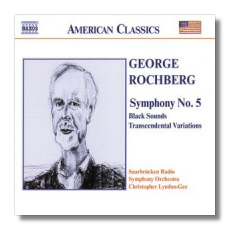
The Internet's Premier Classical Music Source
Related Links
- Rochberg Reviews
- Latest Reviews
- More Reviews
-
By Composer
-
Collections
DVD & Blu-ray
Books
Concert Reviews
Articles/Interviews
Software
Audio
Search Amazon
Recommended Links
Site News
 CD Review
CD Review
George Rochberg

- Symphony #5 [28:47]
- Black Sounds [14:25]
- Transcendental Variations [17:46]
Saarbrücken Radio Symphony Orchestra/Christopher Lyndon-Gee
Naxos American Classics 8.559115 61:03
George Rochberg, born in 1918, is one of the most significant composers of the second half of the 20th Century. For one thing, after beginning as an outstanding serialist, he was the composer most associated with the beginnings of postmodernism in music when he decided that the feelings he wanted his music to express were such that that style could not accommodate them. His Concord Quartets and his Violin Concerto marked that change.
My own acquaintance with Rochberg's music goes back over four decades when I heard George Szell and the Cleveland Orchestra perform Rochberg's Second Symphony in Carnegie Hall, when I was young and open to all things new. Billed at the time as the longest composition based on a single tone row, though not strictly, this symphony held my rapt attention throughout and ended in what seemed like a satisfying tonal resolution. (Edward Downes in his program notes to the Columbia recording said he heard the development as tonal also.) The audience seemed to be at one with my response. Not long after that, I attended a chamber ensemble concert at Cooper Union in New York, organized and conducted by Pierre Boulez, then Music Director of the New York Philharmonic, at which Rochberg was present for the performance of one of his works. I forget which. It's been a very long time. In the 1980's I drove to Tanglewood from Boston to hear Isaac Stern play Rochberg's Violin Concerto which was getting coverage in the press (Newsweek, for instance) at the time because of what it represented as a musical milestone (along with Penderecki's first Violin Concerto.) However, aside from Slow Fires of Autumn, for flute and harp in a Japanese style, which I have discussed online several times without much response from anyone, I have heard little of his music recently. Significantly the (1980) recording of that simultaneously exciting and restful work was on CRI, not on a commercial recording.
My justification for relating this personal history is that it rather parallels the public attention Rochberg has had over the years. Take this recently recorded Fifth Symphony (1985). The première was about eighteen years ago, with the Chicago Symphony under Georg Solti. Has it been performed since? No it has not. In fact, the present Naxos recording took place, in the absence of a public performance, only in the studio. After the final take, as there was time remaining, the orchestra gave a private performance for the composer and his wife. But it is a powerful symphony and is very much worth hearing. I will come back to it.
Meanwhile, in all honesty, I suppose it is a reflection of the reactionary turn my taste has taken in recent years that I bought this disc in Borders because on the back it said that the "Transcendental Variations (1975) is one of the most searingly beautiful works ever conceived for the intimate medium of the string orchestra." How could anyone pass that up? A reworking of the slow movement of Rochberg's Third String Quartet and a tribute to Mahler, this exquisite piece has seven sections, all slow and quiet, with markings like "amoroso," "adagio sereno," "molto adagio e tranquillo" and "Moving gently" (!) Need more be said? Lyndon-Gee thinks the title has to do with Rochberg's philosophy and not the Concord group, but I think he may be mistaken about that.
The symphony does require more comment. The opening sounds like Francesca da Rimini revisited in her eternal whirlwind unrest a century later. This work also has seven sections, but is in a single movement. Christopher Lyndon-Gee, in his extensive note (which includes a discussion of Rochberg's "extraordinary understanding of the nature of time"), distinguishes an opening statement, three episodes, two development sections and a finale. The quiet central episode is extraordinary and is worth the price of this disc several times over. It is for four horns, with some unusual sonorities, and lasts about five and a half minutes. (This section will be of interest to all brass players; in fact the commission originally carried the stipulation from the – at that point anonymous George Szell – that the work be a concerto for brass.) The other episode is lyrical, with the remaining, dramatic, sections on the harrowing side: not unrelenting though; there are some long rests.
Black Sounds is the earliest of these three works, each a decade apart in time of composition, and is a tribute to Varese. I can't say that I am fond of it. It tends to be snarly, harsh and dissonant, though there are some gentler passages, and the use of percussion is interesting. It could grow on me.
Copyright © 2004, R. James Tobin


















